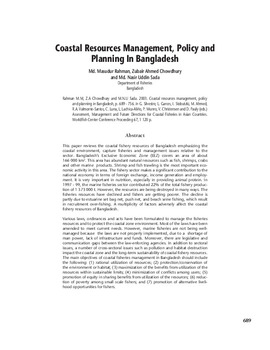Coastal resources management, policy and planning in Bangladesh

Citation
Rahman, M.M.; Chowdhury, Z.A.; Sada, M.N.U. (2003). Coastal resources management, policy and planning in Bangladesh. p. 689-756. Assessment, management and future directions for coastal fisheries in Asian countries. WorldFish Center conference proceedings; 67
This paper reviews the coastal fishery resources of Bangladesh emphasizing the coastal environment, capture fisheries and management issues relative to the sector. Bangladesh’s Exclusive Economic Zone (EEZ) covers an area of about 166 000 km2. This area has abundant natural resources such as fish, shrimps, crabs and other marine products. Shrimp and fish trawling is the most important economic activity in this area. The fishery sector makes a significant contribution to the national economy in terms of foreign exchange, income generation and employment. It is very important in nutrition, especially in providing animal protein. In 1997 - 99, the marine fisheries sector contributed 22% of the total fishery production of 1 373 000 t. However, the resources are being destroyed in many ways. The fisheries resources have declined and fishers are getting poorer. The decline is partly due to estuarine set bag net, push net, and beach seine fishing, which result in recruitment over-fishing. A multiplicity of factors adversely affect the coastal fishery resources of Bangladesh. Various laws, ordinances and acts have been formulated to manage the fisheries resources and to protect the coastal zone environment. Most of the laws have been amended to meet current needs. However, marine fisheries are not being well-managed because the laws are not properly implemented, due to a shortage of man power, lack of infrastructure and funds. Moreover, there are legislative and communication gaps between the law-enforcing agencies. In addition to sectoral issues, a number of cross-sectoral issues such as pollution and habitat destruction impact the coastal zone and the long-term sustainability of coastal fishery resources. The main objectives of coastal fisheries management in Bangladesh should include the following: (1) rational utilization of resources; (2) protection/conservation of the environment or habitat; (3) maximization of the benefits from utilization of the resources within sustainable limits; (4) minimization of conflicts among users; (5) promotion of equity in sharing benefits from utilization of the resources; (6) reduction of poverty among small scale fishers; and (7) promotion of alternative livelihood opportunities for fishers.
Permalink
Date Available
Type
Publisher
Countries
Copyright
CC BY 4.0
Research Themes
Topics
Language